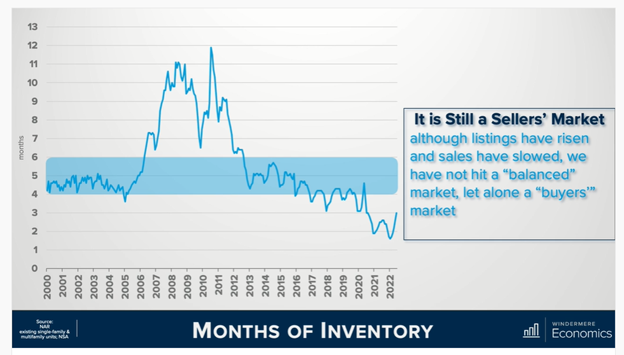We’ve come out of a market with historic price appreciation, 70-80+% of offers at/above asking price and a record sales pace to now a market with  sales slumping by 20% and sale prices 20-25% off our peak prices of April and May of this spring. Hold on to your head and your hat!
sales slumping by 20% and sale prices 20-25% off our peak prices of April and May of this spring. Hold on to your head and your hat!
We’ve seen interest rates climb from roughly 3% this spring to basically 7% right now. Yikes! Year over year prices are still up, but minimally now, over last year’s prices. Prices likely fall below last year’s prices in most of our area as we head further into the fall and winter market times.
Where will the whiplash go next? Affordability is declining with interest rate increases. Sales pace will likely continue to decline as rates rise. So will prices continue to drop as well? How much further and when will rates begin to improve? Lots of really big questions are on our minds right now. The answers aren’t simple.
First some perspective.
We really don’t want to compare our present market to the most unusual market activity in real estate history. This means we can’t really compare today’s or tomorrow’s market to 2021 or the first half of 2022. These were anomaly markets in price appreciation, pace and frenzy that were not and never should be considered normal. They weren’t. So you have to go back to 2018 or 2019 to gain some sense of perspective on inventory levels, sales paces and in most cases prices. Since 2020 had Covid interruptions, again, an anomaly year for most any comparisons.
Our inventory levels in King County are 500-1500 fewer homes today than 2019 and 2018 levels while our pending sales are 700 and 400 below 2019 and 2018 levels. So, yes, our sales are off; again mostly a factor of affordability. Our median price is $200K above those years; no small detail to overlook, and we’re $120K over 2020’s prices and $50K above 2021’s median price. We’ve had prolonged low interest rates—manipulated by government intervention, since those years, and our wage growth, population, household formations and job growth have increased demand and home prices. Today the government’s interference has the opposite intent. The Fed has been outspoken that they want to shut down or crush the housing market as they attempt to bring inflation under control. Every real estate sale has a profound positive impact on other industries, so to slow the entire economy, you target the biggest impacts first. Real Estate is that biggest target.
So what lies ahead?
I sure wish I knew the full answer but here’s a few points to keep in mind. We have a lot of tech employment in our area—right? Yes. Stock values on most of our large local employers are down about 31% in the past year; Apple only 21% but others more. That said, while hiring has slowed, layoffs aren’t slated to be large as these employers know the struggles to find new talent to help them grow or maintain prosperity in challenging financial times. It’s cheaper to keep the talent, regardless of cost, than to find and recruit replacements. That’s very stabilizing for our region.
We also know that household formations are continuing to grow (appx 1.7M in 2022) as millennials age up and get better jobs—see comment above on need to find replacement employees. Small studio and 1 bdrm apartments are out there but larger apartments and rental houses are harder to find and prices for those are rising; in much of our area by 20+% in the last year. So, if rents are rising, inflation is rising and you need a place to live, do you buy and get some stability to your cost of living or continue to rent and wait for prices and interest rates to drop? It’s not likely prices and interest rates will be dropping at the same time. Any relief in interest rates or home prices likely increases demand.
Lots of conversations and fear about recession.
Are we in one, is it coming, when, for how long, ho w severe?
w severe?
We’ve already changed the definition of a recession—2 consecutive quarters of declining GDP. It’s hard to say we’re in a recession when unemployment is so low, spending is still strong and inflation is still so high. The new perspective is we’ve dropped off the skyrocketing inflation pace but not really hit a recession yet. The sad point is, there’s no new agreed upon data to say what is a recession. So again, some perspective is needed.
With the overall low unemployment levels and the strong wage levels presently in place, most forecasts I’m seeing say these factors will moderate the depth and likely duration of any economic downturn. While the Fed said they’d like to see unemployment rise by another 1.5-2%, so something into the 5%+ range, employers are resistant to cut staff, again as it’s been very hard to staff up since the Covid outbreak. Employers think they can maintain profitability, even with higher labor costs. This is good news for business but gives the Fed more reason to keep interest rates high to help fight inflation. So who wins this struggle? The Fed has indicated it will be making another .75-1.25% rise in their rates by the end of this year. That won’t translate completely to mortgage rates but it’s not good news for housing. There is some indication the Fed may actually stop at the .75% increase level and then sit still to see how the economy reacts and performs for a few months, before taking any further action.
What does all of this mean for house prices and affordability?
I mentioned at the outset, there isn’t a short answer or clear path. As long as this article is, that point hasn’t changed, yet. Good jobs are always good for the housing market. Household formations are good for housing. High interest rates are not. We’re starting to see more effective Adjustable Rate Mortgages come back into the market. Agents and Sellers are also recognizing the value of interest rate buy downs, to buy down the interest rate on your new home to a 5% or so range is more helpful to buyers than a $40-80K price reduction. The hope being, if we can make monthly payments more affordable by ARMs or buy downs, more people can afford to buy that next home while prices are having a near term decline. That said, while inventory levels are at similar levels to our peak markets and below our pre-2019 levels, we are still short on inventory. We need more homes to sell. That’s good and bad for the housing market. Low inventory means stable or upward pressure on home prices but that leads to higher prices and less affordability.
Let’s talk a bit more about inventory:
Builders have never gotten back up to their normal building levels seen prior to the 2008 Recession. They’ve been well off the pace of building for 15+ years now. That means we’re not going to be building our way out of an inventory shortage. We also had record high refinance levels from 2020 until early this year. Homeowners locked in mortgage rates from 2.75-3.5% levels for 15-30 year terms. Many of them won’t be selling soon in the face of 7% interest rates today. So, if you’re thinking inventory levels will continue to climb, you may need to reconsider that scena rio. With strong employment levels and near record high equity levels most homeowners have in their homes, desperate sellers won’t be that common. If we do see any sense of an economic downturn, and I expect we will, it should help reduce interest rates but likely only to the 6% range. This still improves payments and affordability by 10%. That’s a good thing for housing but likely puts more demand on inventory.
rio. With strong employment levels and near record high equity levels most homeowners have in their homes, desperate sellers won’t be that common. If we do see any sense of an economic downturn, and I expect we will, it should help reduce interest rates but likely only to the 6% range. This still improves payments and affordability by 10%. That’s a good thing for housing but likely puts more demand on inventory.
So who would buy or sell a home now?
Great question. Real estate is based on change and change is a constant in all of our lives. It operates at different points, levels and speeds but it’s always happening. When do you change your home? For most, only when there is a real need or desire. Given our current market mentality, it may take a bigger change to have you move. The expectations are that the stock market levels will get back to their recent top levels by 2024-2025. Housing may be in that same timeframe as well. So, if you’re going through change and you would live in your new home for the next 5-7 years (the new norm is now 10-11 years of time for staying in our homes) and you can find and afford that home you want now, why wouldn’t you make that change now. It’s likely you’ll be able to lower your future payments soon, by refinancing, and you can secure that home now, at a lower price than earlier this year, with much less likelihood of bidding wars. This may not be the bottom on home prices but you’ll be in this new home plenty long enough to see the price rising, likely above this years’ peak, as our region’s economy rebounds because of our strong economic resources.
Why would you sell now? Again, change. It’s likely interest rates do rise over the next few months and affordability declines. Where are you going? When would you like to be there? Today’s market likely offers you a great return on your investment and provides the funds and freedom you need to go where you’d like to be. The bridge between where you are and where you want to be may be closer now than recent times. Will the Spring market be better? This is a matter of analyzing specific circumstances about your home, your hyper-local market conditions and your situational needs. The overall reality is, if you have the need, the market is still quite strong and selling your home at a very good value is still a reality we can achieve. It may not be our peak but it’s almost certainly higher than most any time in our region.
One last point on who should buy a home now.
Remember when I mentioned Builders are building way fewer homes since 2007? The most troubling part of th0se statistics are the vast majority of recent permits have been for multi-family homes—often apartments, most commonly 1-bedroom apartments—some for condominiums and townhouses and fewer for detached single family homes. While these alternative home choices help with affordability, what they are also doing is dwindling our single-family home supply. This shrinking supply or addition to inventory is driving up prices and taking away the opportunity for the number one wealth generating asset in our country—owning your own home. The data shows homeowners have 400% greater net worth than non-homeowners. Our homes are often our number one asset as it’s harder to save money in the face of rising rents. Locking in our cost of housing, even at higher interest rates, helps promote your long-term net worth. From this perspective we should all be buying a home or investment property to help improve our future net worth. This is becoming harder to do with shrinking inventories, while also more essential.
Our present economic conditions are unique. The “right” answer on what you should do is also unique. My goal has always been to offer you a place of calm, of perspective and of information so you can make a more informed decision. One thing I know is certain, our region will remain strong, housing demand will continue and in the not-too-distant future, we’ll see home values rising and interest rates declining. Where these conditions overlap with your needs is something I’m happy to discuss and offer you guidance on. Let me know when you need my assistance. I’m happy to help.
Thank you for your time.
Top photo courtesy of Hans-peter-gauster/Unsplash
Chaos photo courtesy of Brett Jordan/Unsplash
 Facebook
Facebook
 X
X
 Pinterest
Pinterest
 Copy Link
Copy Link